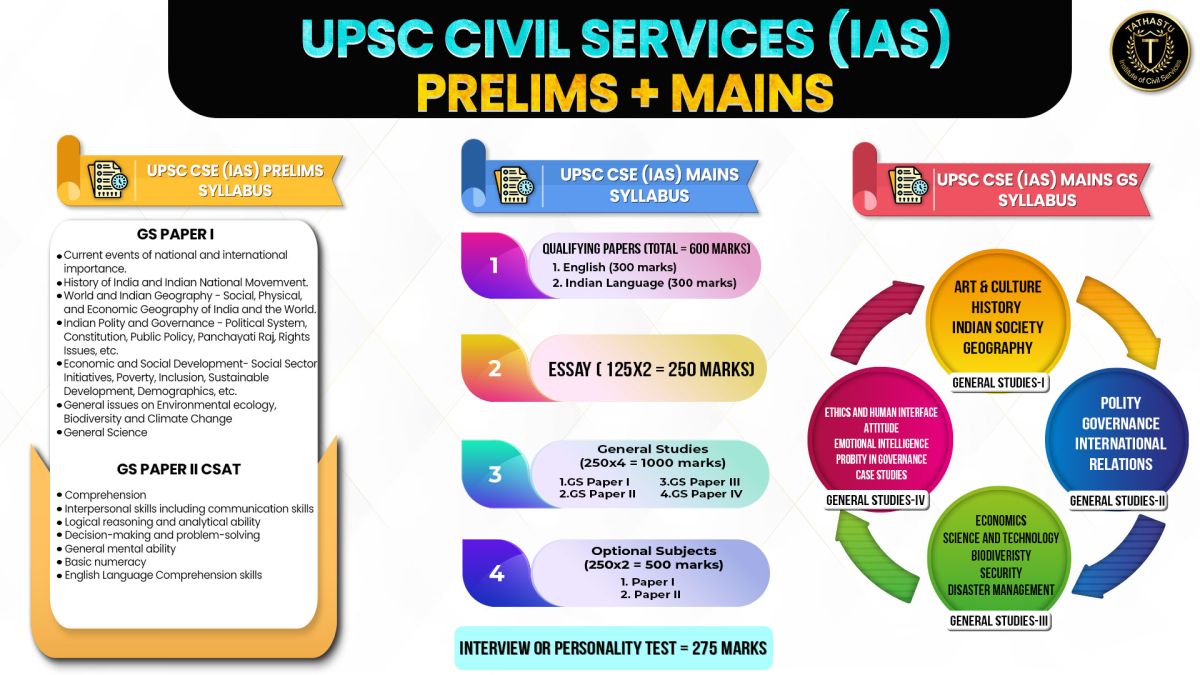Special Batch Available Morning & Evening Click Here
Special Batch Available Morning & Evening Click Here

The Civil Services Examination (CSE) conducted by the Union Public Service Commission (UPSC) is among the most sought-after and toughest exams in India. This examination demands a well-planned and disciplined strategy, learning a very extensive syllabus covering History, Geography, Polity, Economics, Environment, and so on. Candidates should have a systematic understanding of the syllabus and chalk out a strategy to guide their preparation efficiently.
The UPSC examination is conducted in three stages:
Preliminary Exam (Prelims) – Objective-type screening test.
Mains Exam – A written descriptive examination.
Personality Test (Interview) – The test assesses the suitability for a bureaucratic role.
The Prelims consists of two objective papers:
General Studies Paper I – This covers history, geography, economics, environment, polity, science, and current affairs.
General Studies Paper II (CSAT) – This assesses comprehension, logical reasoning, and analytical ability.
Understand the syllabus: To have a clear roadmap of what to study prevents unnecessary effort on irrelevant topics.
Regular newspaper reading: To stay updated with current affairs through reputable sources like The Hindu or Indian Express.
NCERTs as a foundation: To build your basics with NCERT textbooks before moving to advanced materials.
Mock Tests & Previous Year Papers: Timed practice helps with accuracy and time management.
Effective revision techniques: To revise at least twice before the exam to retain information efficiently.
The Mains examination is the real test of a candidate’s depth of understanding. It consists of:
9 descriptive papers (2 qualifying, 7 counted for merit)
Includes General Studies (GS) Papers, an Essay paper, and an Optional Subject
Develop answer writing skills: The ability to present answers concisely and effectively is critical.
Focus on interlinking topics: Many subjects like governance, economy, and international relations overlap.
Practice time-bound writing: Simulating exam conditions improves speed and articulation.
Emphasize conceptual clarity: Instead of rote learning, focus on understanding and analyzing topics deeply.
The UPSC interview, or Personality Test, is the final hurdle. It evaluates a candidate’s ability to think critically, communicate effectively, and handle pressure with composure. The panel assesses not just knowledge but also personality, ethical values, leadership, and presence of mind.
Stay updated on current affairs: Expect questions on recent national and international events.
Know your Detailed Application Form (DAF): Questions often revolve around personal background, hobbies, and educational qualifications.
Develop confidence & clarity: Expressing opinions logically and diplomatically is essential.
Mock Interviews: Under the guidance of Dr. Tanu Jain (Ex-Civil Servant), Tathastu ICS conducts specialized mock interviews to help aspirants get familiar with the real experience. These help in overcoming anxiety and refining communication skills.
Work on body language: Confidence, politeness, and clarity in speech play a huge role in making a lasting impression.
The optional subject is a crucial determinant of an aspirant’s rank. It carries 500 marks and should be selected based on interest, scoring potential, and available resources.
Familiarity and interest: A subject you enjoy studying will be easier to master.
Scoring potential: Some subjects have a history of yielding higher marks.
Availability of study material and guidance: Coaching, books, and mentorship play a role in thorough preparation.
Overlap with General Studies: Subjects like Political Science, History, Geography, and Sociology have considerable overlap with GS papers.
Understand the syllabus thoroughly.
Read standard reference books and make concise notes.
Analyze previous years’ question papers to identify trends.
Answer writing practice is key to scoring well.
Cracking the UPSC exam requires a well-planned approach, dedication, and the right guidance. While self-study is important, mentorship plays a crucial role in structured preparation. Coaching institutes like Tathastu ICS provide expert guidance, test series, and mock interviews, helping aspirants navigate this challenging journey with confidence.
With determination, consistency, and strategic preparation, success in the UPSC exam is within reach. Stay focused, believe in yourself, and keep pushing forward!